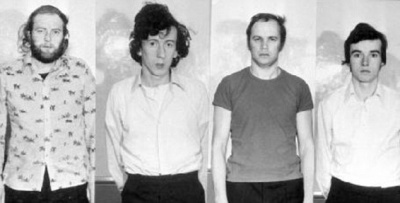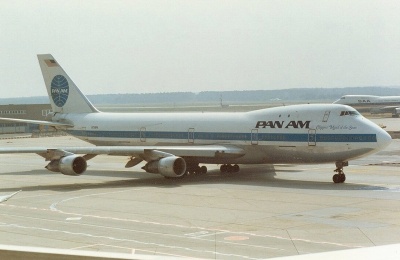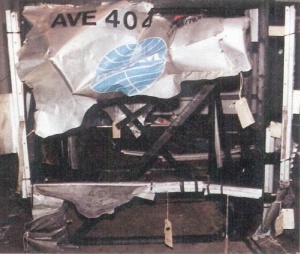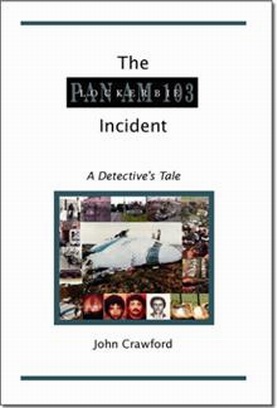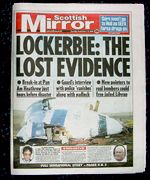Difference between revisions of "Peter Imbert"
("Confession in Guildford Four case 'accurate': Former police chief says he made shorthand record of interview on planting of pub bomb") |
m (tidy references,description) |
||
| (15 intermediate revisions by 3 users not shown) | |||
| Line 1: | Line 1: | ||
{{person | {{person | ||
|image=Peter_Imbert.jpg | |image=Peter_Imbert.jpg | ||
| − | |wikipedia= | + | |wikipedia=https://en.wikipedia.org/wiki/Peter_Imbert,_Baron_Imbert |
|constitutes=policeman | |constitutes=policeman | ||
| + | |birth_date=1933-04-27 | ||
| + | |birth_name=Peter Michael Imbert | ||
|employment={{job | |employment={{job | ||
| − | |title=Commissioner of Police of the Metropolis | + | |title=Commissioner of Police of the Metropolis |
| − | |start=1987 | + | |start=1 January 1987 |
| − | |end= | + | |end=31 December 1992 |
| − | |description= | + | |description=Former Chief Constable of Thames Valley Police |
}} | }} | ||
}} | }} | ||
| − | '''Peter Michael Imbert, Baron Imbert''' | + | '''Peter Michael Imbert, Baron Imbert''' is the former Chief Constable of Thames Valley Police (1979-1985) and Commissioner of the [[Metropolitan Police Service]] from 1987 until 1993. Imbert suffered a heart attack in 1990, and took six months off duty. Further illness in 1992 led to his retirement from the police on 31 January 1993. |
| − | On 6 May 1993, ''The Independent'' newspaper reported that former Police Commissioner Sir Peter Imbert had made a shorthand record of his interview with Patrick Armstrong on the planting of the Guildford pub bombs on 5 October 1974. Sir Peter was in the witness box at the Old Bailey to assist three former Surrey police officers accused of perverting the course of justice by lying under oath. Imbert told the court that his record of one of the [[Guildford Four]] confessing to planting a pub bomb which killed five people was 'as accurate as one could humanly make it'.<ref>[http://www.independent.co.uk/news/uk/confession-in-guildford-four-case-accurate-former-police-chief-says-he-made-shorthand-record-of-interview-on-planting-of-pub-bomb-2321124.html "Confession in Guildford Four case 'accurate': Former police chief says he made shorthand record of interview on planting of pub bomb"]</ref> | + | On 6 May 1993, ''The Independent'' newspaper reported that former Police Commissioner Sir Peter Imbert had made a shorthand record of his interview with Patrick Armstrong on the planting of the Guildford pub bombs on 5 October 1974.<ref>[http://news.bbc.co.uk/onthisday/hi/dates/stories/october/5/newsid_2492000/2492543.stm "1974: Four dead in Guildford bomb blasts"]</ref> Sir Peter was in the witness box at the Old Bailey to assist three former Surrey police officers accused of perverting the course of justice by lying under oath. Imbert told the court that his record of one of the [[Guildford Four]] confessing to planting a pub bomb which killed five people was 'as accurate as one could humanly make it'.<ref>[http://www.independent.co.uk/news/uk/confession-in-guildford-four-case-accurate-former-police-chief-says-he-made-shorthand-record-of-interview-on-planting-of-pub-bomb-2321124.html "Confession in Guildford Four case 'accurate': Former police chief says he made shorthand record of interview on planting of pub bomb"]</ref> |
He was the Lord Lieutenant of Greater London until 2008, and was made a Life Peer as '''Baron Imbert''' of New Romney in the County of Kent in 1999.<ref>[http://www.parliament.uk/biographies/lords/lord-imbert/2531 "Lord Imbert in the House of Lords"]</ref> | He was the Lord Lieutenant of Greater London until 2008, and was made a Life Peer as '''Baron Imbert''' of New Romney in the County of Kent in 1999.<ref>[http://www.parliament.uk/biographies/lords/lord-imbert/2531 "Lord Imbert in the House of Lords"]</ref> | ||
| Line 20: | Line 22: | ||
==Metropolitan Police== | ==Metropolitan Police== | ||
| − | In 1956, Peter Imbert joined [[Special Branch]], learning shorthand and Russian during his 17 years with the unit. In 1973, he was made deputy head of the Metropolitan Police Anti-Terrorist Branch, where he became an expert on European terrorist groups such as the Red Army Faction (Baader-Meinhof group), and gave lectures on hostage negotiation and counter-terrorism tactics. | + | In 1956, Peter Imbert joined [[Special Branch]], learning shorthand and Russian during his 17 years with the unit. In 1973, as Detective Superintendent, he was made deputy head of the Metropolitan Police Bomb Squad (later renamed Anti-Terrorist Branch), where he became an expert on European terrorist groups such as the Red Army Faction (Baader-Meinhof group), and gave lectures on hostage negotiation and counter-terrorism tactics. |
| − | ===Balcombe Street | + | ===Balcombe Street siege=== |
| + | [[File:Balcombe_Street_Gang.jpg|400px|right|thumb|'''Balcombe Street Four''': Hugh Doherty, Martin O'Connell, Edward Butler and Harry Duggan]] | ||
On 6 December 1975, four members of the Provisional IRA barricaded themselves in a flat in Balcombe Street, Marylebone with two hostages. The men had been responsible for a wave of bombings in London, but had been intercepted by armed police while attacking a restaurant.<ref>[http://www.professionalsecurity.co.uk/blogs/unas-blog/una-in-may-2013/ "''Professional Security'' magazine interview"]</ref> | On 6 December 1975, four members of the Provisional IRA barricaded themselves in a flat in Balcombe Street, Marylebone with two hostages. The men had been responsible for a wave of bombings in London, but had been intercepted by armed police while attacking a restaurant.<ref>[http://www.professionalsecurity.co.uk/blogs/unas-blog/una-in-may-2013/ "''Professional Security'' magazine interview"]</ref> | ||
| − | + | On 12 December 1975, Joseph O'Connell, Harry Duggan, Hugh Doherty and Eddie Butler were arrested in London at the conclusion of what has become known as the Balcombe Street siege. After a dramatic car-chase through the West End the previous Saturday, the four had taken refuge in 22b Balcombe Street, Marylebone, the home of an elderly couple, Mr and Mrs Matthews, whom they held hostage for six days. | |
| + | |||
| + | News pictures of the siege and the final surrender of the four were flashed around the world, becoming some of the most familiar in the history of photojournalism. The IRA maintained that the reason the men remained so long in the flat, with no possibility of escape, was to win maximum publicity for the IRA cause; and to ensure that after their surrender the men would not be assaulted by either the police or prison staff. (In view of what had happened a year earlier to those accused of the [[Birmingham Six|Birmingham bombings]], this seemed a sensible precaution.) Once safely in police custody, the four gave their names, where they came from, and added that they were all IRA volunteers.<ref>[http://news.bbc.co.uk/onthisday/hi/dates/stories/december/12/newsid_2546000/2546477.stm "1975: Balcombe Street siege ends"], BBC News, 12 December 1975.</ref> | ||
| + | |||
| + | Police interrogators Detective Chief Superintendent [https://en.wikipedia.org/wiki/Jim_Nevill Jim Nevill] and [[Detective Superintendent Peter Imbert]] of the Bomb Squad asked Eddie Butler what was the first job he had done in England. Somewhat to their surprise, he told them. It was the bombing of the King's Arms in Woolwich. | ||
| + | :"You've already got someone for that," Butler added. | ||
| + | It soon became apparent that the police had got the break they needed and had captured the Active Service Unit (ASU) responsible for the intensive | ||
| + | bombing campaign conducted throughout London and south-east England since August 1974. Their delight at such success, however, must have been tempered by the embarrassment of realising that the Surrey Constabulary had got it all wrong. [[Guildford Four|The four jailed for the Guildford and Woolwich bombs]] had nothing to do with them. | ||
| + | |||
| + | The Balcombe Street four came to trial at the Old Bailey on 24 January 1977. There were exactly one hundred indictments. Each defendant was charged on a total of twenty-five counts of murder and causing explosions, relating to the period from December 1974 to December 1975. There was no reference to incidents during the autumn of 1974. In normal circumstances IRA defendants would have refused to recognise the court, and thus declined to take any part in its proceedings. They reasoned that, as Irish Republicans at war with British imperialism, they were hardly likely to secure justice in an English court. On this occasion, however, they opted to become more actively involved: they felt they had been handed the perfect opportunity to demonstrate the hollowness of what they would pejoratively have referred to as "British justice". Although they refused | ||
| + | to plead, therefore, they did make statements. O'Connell said, 'I refuse to plead because the indictment does not include two charges concerning the Guildford and Woolwich pub bombings – I took part in both – for which innocent people have been convicted.' Butler and Duggan made similar statements. The prosecution case closed on 7 February 1977. Defence counsel told the judge that no witnesses would be called on behalf of the defence, but that instead Joseph O'Connell would make a statement from the dock. Mr Justice Cantley immediately responded that he would not allow a political speech. O'Connell went ahead regardless. Of course, most of the speech was political ('We say that no representative of British imperialism is fit to pass judgment on us.' etc). The part relating to the Guildford and Woolwich trials ran as follows: | ||
| + | |||
| + | :We are all four Irish Republicans. We have recognised this court to the extent that we have instructed our lawyers to draw the attention of the court to the fact that four totally innocent people – Carole Richardson, Gerard Conlon, Paul Hill and Patrick Armstrong – are serving massive sentences for three bombings, two in Guildford and one in Woolwich, which three of us and another man now imprisoned have admitted that we did. The Director of Public Prosecutions was made aware of these admissions in December 1975 and has chosen to do nothing. We wonder if he will still do nothing when he is made aware of the new and important evidence which has come to light through the cross-examination by our counsel of certain prosecution witnesses in this trial. The evidence of Higgs and Lidstone played a vital part in the conviction of innocent people. Higgs admitted in this trial that the Woolwich bomb formed part of a correlated series with other bombings with which we were charged. Yet when he gave evidence at the earlier Guildford and Woolwich trial he deliberately concealed that the Woolwich bomb was definitely part of a series carried out between October and December 1974, and that the people on trial were in custody at the time of some of these bombings. Lidstone in his evidence tried to make little of the suggestions that the Guildford bombs could have been part of the "phase one" bombings with which we are accused with the excuse, and this appeared to be his only reason, that the bombings in Guildford had occurred a long time before the rest. When it was pointed out to him that there were many clear links between Caterham and Guildford and that the time between Guildford and the Brooks Club bomb with which we were originally charged was 17 days and that Woolwich occurred 16 days later, and that equal time gaps occurred between many of the incidents with which we were charged, Lidstone backtracked and admitted that there was a likely connection. This shifty manoeuvring typifies what we, as Irish Republicans, have come to understand by the words "British justice". | ||
| + | On 9 February 1977, the jury acquitted the defendants on twenty-six of the hundred indictments. On the remaining charges, the Balcombe Street Four were found guilty and each received a thirty-year minimum sentence. | ||
| + | <ref>[https://wikispooks.com/w/images/2/2f/Guildford4.pdf "The trial of the Balcombe Street Four"]</ref> All were released on 14 April 1999 under the terms of the Good Friday Agreement.<ref>[http://www.theguardian.com/uk/1999/apr/10/johnmullin "Balcombe Street Gang to be freed"]</ref> | ||
==County forces== | ==County forces== | ||
| Line 35: | Line 52: | ||
Peter Imbert returned to [[Scotland Yard]] in 1985 as Deputy Commissioner, becoming Commissioner two years later. | Peter Imbert returned to [[Scotland Yard]] in 1985 as Deputy Commissioner, becoming Commissioner two years later. | ||
| − | Building on the reforms to the Met implemented by his predecessor, [https://en.wikipedia.org/wiki/Kenneth_Newman Sir Kenneth Newman,] Imbert began his own set of reforms called the PLUS program, aiming to improve the corporate image and quality of service of the Met. The programme saw the Met renamed from the "[[Metropolitan Police Force]]" to the "[[Metropolitan Police Service]]", the name it has retained to this day.<ref> | + | Building on the reforms to the Met implemented by his predecessor, [https://en.wikipedia.org/wiki/Kenneth_Newman Sir Kenneth Newman,] Imbert began his own set of reforms called the PLUS program, aiming to improve the corporate image and quality of service of the Met. The programme saw the Met renamed from the "[[Metropolitan Police Force]]" to the "[[Metropolitan Police Service]]", the name it has retained to this day.<ref>Fleming, Robert; Hugh Miller (1995). Scotland Yard. London: Signet. ISBN 0-451-18250-2.</ref> In addition, a "Statement of Common Purpose and Values" was devised. |
| + | |||
| + | ===Worst ever terrorist outrage=== | ||
| + | [[File:Clipper_Maid_of_the_Seas.jpg|400px|thumb|right|Boeing 747-121 ''"Clipper Maid of the Seas"'' in July 1986]] | ||
| + | [[File:Container_AVE_4041.jpg|300px|right|thumb|Damaged baggage container AVE4041]] | ||
| + | [[File:Bomb_bag.jpg|300px|right|thumb|Replica of the [[Pan Am Flight 103|Lockerbie "bomb bag"]] that was loaded into baggage container AVE4041]] | ||
| + | [[File:Carlsson_Pan_Am_103.jpg|400px|right|thumb|[[United Nations Commissioner for Namibia]] [[Bernt Carlsson#Assassinated on Pan Am Flight 103|Bernt Carlsson]], the prime target on [[Pan Am Flight 103]], 21 December 1988]] | ||
| + | On 21 December 1988, at 1903 hours, [[Pan Am Flight 103]] exploded over Lockerbie in Scotland killing all 259 passengers and crew, and eleven people in the town, in Britain's worst ever terrorist outrage. The jumbo jet had arrived from San Francisco in the afternoon and had been loaded from empty at London's Heathrow airport. The bomb must therefore have been loaded at Heathrow, ''ergo'' a matter for the Met to investigate. Sir Peter Imbert, the former [[Scotland Yard]] Anti-Terrorist Branch officer and the then Commissioner of the [[Metropolitan Police Service]] must have been rubbing his hands in anticipation of taking charge of the Lockerbie inquiry. | ||
| + | |||
| + | However, the [[FBI]] had concluded, as a 31 December 1988 internal memo stated, that the bomb had “entered the Pan Am system at Frankfurt.” They had hoped to keep it out of the news to prevent the terrorists knowing what they knew: | ||
| + | :“Like [https://en.wikipedia.org/wiki/John_Boyd_(military_strategist) John Boyd], [https://en.wikipedia.org/wiki/William_S._Sessions Judge Sessions] and [[Buck Revell]] they wanted to keep a close hold on the Frankfurt connection.” | ||
| + | It was therefore a minor disaster when ''The Times'' ran its New Year’s headline:''"Disaster bomb was 'placed on board jumbo in Frankfurt'"''<ref>[http://www.steveemerson.com/4396/the-fall-of-pan-am-103 "The Fall of Pan Am 103"] by Steven Emerson and Brian Duffy</ref> | ||
| + | |||
| + | But it seems, Imbert was mightily relieved not to have been in charge of the [[Pan Am Flight 103|Lockerbie bombing]] investigation:<ref>[http://lockerbiedivide.blogspot.co.uk/2010/06/what-did-british-know.html "What Did The British Know?"]</ref> | ||
| + | :“Sir Peter Imbert, Commissioner of the Metropolitan Police, was naturally concerned about the possibility that the bomb had slipped through security at Heathrow. It was therefore a great relief when it was proved within the first weeks that the bomb had been inside a pallet containing luggage which had passed through Heathrow from other airports.”<ref>[http://www.amazon.co.uk/On-Trail-Terror-Lockerbie-Investigation/dp/0224030302 "On the Trail of Terror: Inside Story of the Lockerbie Investigation"] page 60</ref> | ||
| + | |||
| + | It took fourteen years before it was revealed that a former Heathrow Airport security guard said he found a baggage store padlock "cut like butter" the night before the [[Pan Am Flight 103|Lockerbie bombing]]. Ray Manly was giving evidence at the 2002 appeal by [[Abdelbaset al-Megrahi]] against his conviction on 31 January 2001 for murdering 270 people in the 1988 bombing. [[Megrahi]]'s defence team argued that the bomb could have been placed on [[Pan Am Flight 103]] at Heathrow. Evidence about the reported break-in was not introduced at the trial and was only now being heard for the first time. Mr Manly was on a night shift in Terminal 3 on the night of 20/21 December 1988. He told the Scottish Court in the Netherlands that the doors separating landside from airside were unmanned at night after they had been locked. During his rounds, he spotted that a padlock securing the doors had been broken. At the Lockerbie trial, one of the key areas of the prosecution case was that the bomb was loaded onto a feeder flight from Luqa Airport in Malta, where [[al-Megrahi]] worked. | ||
| + | :"The padlock was on the floor. In my opinion it was as if it had been cut like butter - very professional," he said. "I believe it would be possible for an unauthorised person to obtain tags for a particular Pan Am flight and then, having broken the CP2 lock, to have introduced a tagged bag into the baggage build up area."<ref>[http://news.bbc.co.uk/1/hi/1793505.stm "'Break-in' before Lockerbie bombing"]</ref> | ||
| + | |||
| + | In 2002, the Appeal Court was shown Mr Manly's security report, written soon after the incident in which he described the break-in as "a very deliberate act, leaving easy access to airside". Mr Manly informed his colleague Philip Radley and police were called. But Mr Manly said he did not see any police officers that night and was only interviewed by the Met's Anti-Terrorist Squad officers on 31 January 1989, over a month after the [[Pan Am Flight 103|Lockerbie disaster]].<ref>[http://news.bbc.co.uk/1/hi/1817752.stm "Lockerbie appeal hears key witness"]</ref> | ||
| + | |||
| + | It has since been alleged that a team of South African [[Civil Co-operation Bureau]] operatives, led by the [[CCB]]'s London-based director [[Eeben Barlow]], broke through the security door at Terminal 3 of Heathrow airport leading to the Interline Baggage Shed from where flights would be loaded the following day. The [[CCB]] team then ingested the primary suitcase (or "bomb bag") through this security door and tagged it for loading on [[Pan Am Flight 103]].<ref>[http://forum.keypublishing.com/showthread.php?74757-Pan-Am-103-South-Africa-Guilty-!!! "Pan Am 103: South Africa Guilty"]</ref> Thus, Lockerbie's highest profile victim - [[UN Commissioner for Namibia]] [[Bernt Carlsson#Assassinated on Pan Am Flight 103|Bernt Carlsson]] - was targeted on [[Pan Am Flight 103]] by the apartheid regime. | ||
| + | |||
| + | Now in 2015, is it really too late for the Met to redeem its own reputation and for [https://www.facebook.com/groups/118951448146734/893658114009393/ Scotland Yard to launch a Bernt Carlsson murder inquiry?]<ref>[https://www.facebook.com/groups/118951448146734/893658114009393/ "Scotland Yard to launch Bernt Carlsson murder inquiry"]</ref> | ||
| + | |||
| + | ===The Met excluded from investigating Lockerbie=== | ||
| + | [[File:The_Lockerbie_Incident.jpg|300px|right|thumb|[[John Crawford]]'s [[Pan Am Flight 103|Lockerbie]] book was published in August 2002]] | ||
| + | Scottish detective [[John Crawford]] explains in this extract from his 2002 book ''"The Lockerbie Incident: A Detective's Tale"'' how the Met was excluded from investigating the [[Pan Am Flight 103|Lockerbie bombing]]: | ||
| + | :It was hopefully time for me to get involved in the enquiry proper. I know that a considerable amount of political in-fighting had been going on from day one. The [[Metropolitan Police]] Anti-Terrorist Squad from London had tried to make the enquiry theirs from the first day. There was considerable opposition to this both politically and from the Scottish police. | ||
| + | :[[Scotland Yard]] as any ordinary cop knows was living on a reputation built 100 years ago. Sure it had the facilities to conduct a huge enquiry; sure it had the personnel and was supposed to have the expertise. It certainly has the resources in manpower and finance. But ask a cop in any force up and down the country who they consider the most arrogant, the most useless and the least likely to do anything for anyone beyond their ‘patch’ and they will undoubtedly tell you – the Met. | ||
| + | :It’s an unfortunate reputation because I personally know of a number of fine officers in that organisation who would match the best anywhere. But the reputation of the Met precedes it and it does not enjoy the high standing it thinks it does in what it disparagingly calls the ‘provincial’ forces. I would like to think things have changed since then, but I rather think they have not. | ||
| + | :No – neither the Scottish police nor the Lord Advocate [[Lord Fraser of Carmyllie]] wanted them messing around in our enquiry. It was said that the Lord Advocate presented an ultimatum to the then Prime Minister, the Iron Lady herself, [[Margaret Thatcher]], that either he was in charge of the enquiry as befitted his role as Lord Advocate in Scotland or he would resign. I cannot vouch for the veracity of that but as far as the Met Anti-Terrorist Squad were concerned it was all over. | ||
| + | :They were hanging around for a few days with their flashy designer suits and the full weight of their own egos and self importance on their shoulders, the once deserved reputation of [[Scotland Yard]] expected to sweep all before them. After all, what could a bunch of hick ‘jocks’ do, we were experts only in dealing with sheep and haggis – let’s face it, according to them nothing of any consequence ever happened outside London. | ||
| + | :The Met were told in no uncertain manner that they weren’t welcome! It was back to London for them.<ref>[http://www.amazon.co.uk/The-Lockerbie-Incident-Detectives-Tale/dp/1553698061 "The Lockerbie Incident: A Detective's Tale"] pages 70/71</ref> | ||
| − | + | On 2 July 2009, during [[Megrahi]]'s second appeal at Edinburgh's High Court of Justiciary, former policeman [[Barry Walker]] commented on [[Professor Black]]'s blog: | |
| + | [[File:Scottish_Mirror.jpg|300px|right|thumb|11 September 2001 - Front Page News]] | ||
| + | :While I pointed out to the PM's office in 1996, (in response to [[John Major]]'s claim to the House that the investigation was was "open") that the Police had made a colossal blunder in "eliminating" Heathrow I was not aware of the break-in at Terminal 3 early on 21 December 1988. It took thirteen years for news of the break-in to be revealed (''Scottish Mirror'' of 11 September 2001). | ||
| + | :I do not know the significance of this Heathrow break-in and [[Edwin Bollier|Herr Bollier]] is correct that there is no evidence that a suitcase was introduced. However Ruth is absolutely right to say that it is a matter of immense importance. | ||
| + | :The Police had "eliminated" Heathrow in three weeks despite knowing that a bag similar to the primary suitcase had been introduced into baggage container AVE4041 and knowing there had been a serious security breach on the morning of the bombing. | ||
| + | :When I was a Policeman a deadbeat Chief Inspector told me: | ||
| + | ::"It is not what you can do, it is what you can bat away." | ||
| + | :To recognise that the bomb had been introduced at Heathrow would have had profound repercussions. The [[Metropolitan Police]] would have taken over the Lockerbie case, despite the major crime scene being in Scotland, and any prosecution would have been brought in England under English law despite eleven of the victims having been Scottish residents. The [[Lord Advocate]] had demanded jurisdiction over the case. | ||
| + | :It seems to me blindingly obvious that the decision to "eliminate" Heathrow was not arrived at on strictly evidential grounds.<ref>[http://lockerbiecase.blogspot.co.uk/2009/06/dr-swires-letter-to-lord-advocate.html?showComment=1246536717627#c3653029589154618521 "The Metropolitan Police would have taken over the Lockerbie case"]</ref> | ||
==Honours== | ==Honours== | ||
| Line 51: | Line 109: | ||
== Imbert Prize == | == Imbert Prize == | ||
| − | Lord Imbert is a patron of the Association of Security Consultants (ASC), which has awarded the Imbert Prize annually since 2005. The prize is awarded for the development of ideas for the advancement of risk and security management in the UK. It consists of three categories: 1) Best academic dissertation, 2) Most notable contribution in the security industry in the preceding year and 3) The ASC member that has made the most significant contribution to independent security consultancy.<ref> | + | Lord Imbert is a patron of the Association of Security Consultants (ASC), which has awarded the Imbert Prize annually since 2005. The prize is awarded for the development of ideas for the advancement of risk and security management in the UK. It consists of three categories: 1) Best academic dissertation, 2) Most notable contribution in the security industry in the preceding year and 3) The ASC member that has made the most significant contribution to independent security consultancy.<ref>http://www.securityconsultants.org.uk/content/events.asp?ret=latestevents&ID=218 </ref><ref>http://www.info4security.com/story.asp?storyCode=4118854§ioncode=10 | publisher = Info4Security </ref> |
Between 1983 and 2001 Baron Imbert served on the academic consultative committee at Cumberland Lodge.<ref>[http://www.cumberlandlodge.ac.uk/aboutus/trustees_of_cumberland_lodge "Cumberland Lodge: Trustees"]</ref> | Between 1983 and 2001 Baron Imbert served on the academic consultative committee at Cumberland Lodge.<ref>[http://www.cumberlandlodge.ac.uk/aboutus/trustees_of_cumberland_lodge "Cumberland Lodge: Trustees"]</ref> | ||
Latest revision as of 02:17, 9 August 2021
(policeman) | ||||||||||||||||||
|---|---|---|---|---|---|---|---|---|---|---|---|---|---|---|---|---|---|---|
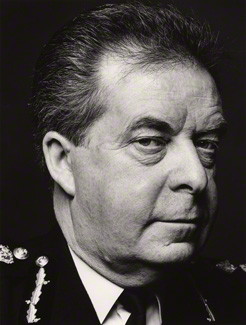 | ||||||||||||||||||
| Born | Peter Michael Imbert 1933-04-27 | |||||||||||||||||
| ||||||||||||||||||
Peter Michael Imbert, Baron Imbert is the former Chief Constable of Thames Valley Police (1979-1985) and Commissioner of the Metropolitan Police Service from 1987 until 1993. Imbert suffered a heart attack in 1990, and took six months off duty. Further illness in 1992 led to his retirement from the police on 31 January 1993.
On 6 May 1993, The Independent newspaper reported that former Police Commissioner Sir Peter Imbert had made a shorthand record of his interview with Patrick Armstrong on the planting of the Guildford pub bombs on 5 October 1974.[1] Sir Peter was in the witness box at the Old Bailey to assist three former Surrey police officers accused of perverting the course of justice by lying under oath. Imbert told the court that his record of one of the Guildford Four confessing to planting a pub bomb which killed five people was 'as accurate as one could humanly make it'.[2]
He was the Lord Lieutenant of Greater London until 2008, and was made a Life Peer as Baron Imbert of New Romney in the County of Kent in 1999.[3]
Contents
Early life
Born in Kent, Peter Imbert was educated at the Harvey Grammar School in Folkestone, spent his National Service in the Royal Air Force Police and worked for a short time with Kent County Council, before joining the Metropolitan Police in 1953 at Bow Street Police Station.
Metropolitan Police
In 1956, Peter Imbert joined Special Branch, learning shorthand and Russian during his 17 years with the unit. In 1973, as Detective Superintendent, he was made deputy head of the Metropolitan Police Bomb Squad (later renamed Anti-Terrorist Branch), where he became an expert on European terrorist groups such as the Red Army Faction (Baader-Meinhof group), and gave lectures on hostage negotiation and counter-terrorism tactics.
Balcombe Street siege
On 6 December 1975, four members of the Provisional IRA barricaded themselves in a flat in Balcombe Street, Marylebone with two hostages. The men had been responsible for a wave of bombings in London, but had been intercepted by armed police while attacking a restaurant.[4]
On 12 December 1975, Joseph O'Connell, Harry Duggan, Hugh Doherty and Eddie Butler were arrested in London at the conclusion of what has become known as the Balcombe Street siege. After a dramatic car-chase through the West End the previous Saturday, the four had taken refuge in 22b Balcombe Street, Marylebone, the home of an elderly couple, Mr and Mrs Matthews, whom they held hostage for six days.
News pictures of the siege and the final surrender of the four were flashed around the world, becoming some of the most familiar in the history of photojournalism. The IRA maintained that the reason the men remained so long in the flat, with no possibility of escape, was to win maximum publicity for the IRA cause; and to ensure that after their surrender the men would not be assaulted by either the police or prison staff. (In view of what had happened a year earlier to those accused of the Birmingham bombings, this seemed a sensible precaution.) Once safely in police custody, the four gave their names, where they came from, and added that they were all IRA volunteers.[5]
Police interrogators Detective Chief Superintendent Jim Nevill and Detective Superintendent Peter Imbert of the Bomb Squad asked Eddie Butler what was the first job he had done in England. Somewhat to their surprise, he told them. It was the bombing of the King's Arms in Woolwich.
- "You've already got someone for that," Butler added.
It soon became apparent that the police had got the break they needed and had captured the Active Service Unit (ASU) responsible for the intensive bombing campaign conducted throughout London and south-east England since August 1974. Their delight at such success, however, must have been tempered by the embarrassment of realising that the Surrey Constabulary had got it all wrong. The four jailed for the Guildford and Woolwich bombs had nothing to do with them.
The Balcombe Street four came to trial at the Old Bailey on 24 January 1977. There were exactly one hundred indictments. Each defendant was charged on a total of twenty-five counts of murder and causing explosions, relating to the period from December 1974 to December 1975. There was no reference to incidents during the autumn of 1974. In normal circumstances IRA defendants would have refused to recognise the court, and thus declined to take any part in its proceedings. They reasoned that, as Irish Republicans at war with British imperialism, they were hardly likely to secure justice in an English court. On this occasion, however, they opted to become more actively involved: they felt they had been handed the perfect opportunity to demonstrate the hollowness of what they would pejoratively have referred to as "British justice". Although they refused to plead, therefore, they did make statements. O'Connell said, 'I refuse to plead because the indictment does not include two charges concerning the Guildford and Woolwich pub bombings – I took part in both – for which innocent people have been convicted.' Butler and Duggan made similar statements. The prosecution case closed on 7 February 1977. Defence counsel told the judge that no witnesses would be called on behalf of the defence, but that instead Joseph O'Connell would make a statement from the dock. Mr Justice Cantley immediately responded that he would not allow a political speech. O'Connell went ahead regardless. Of course, most of the speech was political ('We say that no representative of British imperialism is fit to pass judgment on us.' etc). The part relating to the Guildford and Woolwich trials ran as follows:
- We are all four Irish Republicans. We have recognised this court to the extent that we have instructed our lawyers to draw the attention of the court to the fact that four totally innocent people – Carole Richardson, Gerard Conlon, Paul Hill and Patrick Armstrong – are serving massive sentences for three bombings, two in Guildford and one in Woolwich, which three of us and another man now imprisoned have admitted that we did. The Director of Public Prosecutions was made aware of these admissions in December 1975 and has chosen to do nothing. We wonder if he will still do nothing when he is made aware of the new and important evidence which has come to light through the cross-examination by our counsel of certain prosecution witnesses in this trial. The evidence of Higgs and Lidstone played a vital part in the conviction of innocent people. Higgs admitted in this trial that the Woolwich bomb formed part of a correlated series with other bombings with which we were charged. Yet when he gave evidence at the earlier Guildford and Woolwich trial he deliberately concealed that the Woolwich bomb was definitely part of a series carried out between October and December 1974, and that the people on trial were in custody at the time of some of these bombings. Lidstone in his evidence tried to make little of the suggestions that the Guildford bombs could have been part of the "phase one" bombings with which we are accused with the excuse, and this appeared to be his only reason, that the bombings in Guildford had occurred a long time before the rest. When it was pointed out to him that there were many clear links between Caterham and Guildford and that the time between Guildford and the Brooks Club bomb with which we were originally charged was 17 days and that Woolwich occurred 16 days later, and that equal time gaps occurred between many of the incidents with which we were charged, Lidstone backtracked and admitted that there was a likely connection. This shifty manoeuvring typifies what we, as Irish Republicans, have come to understand by the words "British justice".
On 9 February 1977, the jury acquitted the defendants on twenty-six of the hundred indictments. On the remaining charges, the Balcombe Street Four were found guilty and each received a thirty-year minimum sentence. [6] All were released on 14 April 1999 under the terms of the Good Friday Agreement.[7]
County forces
In 1976, Imbert left the Met and became Assistant Chief Constable, and later Deputy Chief Constable of Surrey Constabulary. In 1979, he became Chief Constable of Thames Valley Police, the youngest Chief Constable in the country at that time.
During his time at Thames Valley, Imbert allowed the BBC to make Police, a 1982 fly-on-the-wall documentary series about the police at work. The opposite of a public relations exercise, Thames Valley and the police in general came under sustained criticism when an episode of the programme showed three detectives interrogating and dismissing a rape victim. Shocked at the attitude and behaviour of his officers, and the public reaction, Imbert instigated improvements to the handling of rape cases to Thames Valley which were adopted throughout the country.[8]
Back to the Met
Peter Imbert returned to Scotland Yard in 1985 as Deputy Commissioner, becoming Commissioner two years later.
Building on the reforms to the Met implemented by his predecessor, Sir Kenneth Newman, Imbert began his own set of reforms called the PLUS program, aiming to improve the corporate image and quality of service of the Met. The programme saw the Met renamed from the "Metropolitan Police Force" to the "Metropolitan Police Service", the name it has retained to this day.[9] In addition, a "Statement of Common Purpose and Values" was devised.
Worst ever terrorist outrage
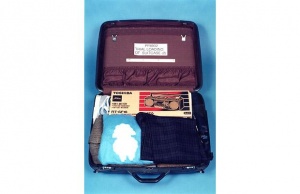
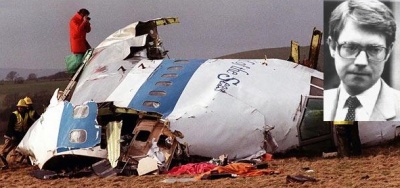
On 21 December 1988, at 1903 hours, Pan Am Flight 103 exploded over Lockerbie in Scotland killing all 259 passengers and crew, and eleven people in the town, in Britain's worst ever terrorist outrage. The jumbo jet had arrived from San Francisco in the afternoon and had been loaded from empty at London's Heathrow airport. The bomb must therefore have been loaded at Heathrow, ergo a matter for the Met to investigate. Sir Peter Imbert, the former Scotland Yard Anti-Terrorist Branch officer and the then Commissioner of the Metropolitan Police Service must have been rubbing his hands in anticipation of taking charge of the Lockerbie inquiry.
However, the FBI had concluded, as a 31 December 1988 internal memo stated, that the bomb had “entered the Pan Am system at Frankfurt.” They had hoped to keep it out of the news to prevent the terrorists knowing what they knew:
- “Like John Boyd, Judge Sessions and Buck Revell they wanted to keep a close hold on the Frankfurt connection.”
It was therefore a minor disaster when The Times ran its New Year’s headline:"Disaster bomb was 'placed on board jumbo in Frankfurt'"[10]
But it seems, Imbert was mightily relieved not to have been in charge of the Lockerbie bombing investigation:[11]
- “Sir Peter Imbert, Commissioner of the Metropolitan Police, was naturally concerned about the possibility that the bomb had slipped through security at Heathrow. It was therefore a great relief when it was proved within the first weeks that the bomb had been inside a pallet containing luggage which had passed through Heathrow from other airports.”[12]
It took fourteen years before it was revealed that a former Heathrow Airport security guard said he found a baggage store padlock "cut like butter" the night before the Lockerbie bombing. Ray Manly was giving evidence at the 2002 appeal by Abdelbaset al-Megrahi against his conviction on 31 January 2001 for murdering 270 people in the 1988 bombing. Megrahi's defence team argued that the bomb could have been placed on Pan Am Flight 103 at Heathrow. Evidence about the reported break-in was not introduced at the trial and was only now being heard for the first time. Mr Manly was on a night shift in Terminal 3 on the night of 20/21 December 1988. He told the Scottish Court in the Netherlands that the doors separating landside from airside were unmanned at night after they had been locked. During his rounds, he spotted that a padlock securing the doors had been broken. At the Lockerbie trial, one of the key areas of the prosecution case was that the bomb was loaded onto a feeder flight from Luqa Airport in Malta, where al-Megrahi worked.
- "The padlock was on the floor. In my opinion it was as if it had been cut like butter - very professional," he said. "I believe it would be possible for an unauthorised person to obtain tags for a particular Pan Am flight and then, having broken the CP2 lock, to have introduced a tagged bag into the baggage build up area."[13]
In 2002, the Appeal Court was shown Mr Manly's security report, written soon after the incident in which he described the break-in as "a very deliberate act, leaving easy access to airside". Mr Manly informed his colleague Philip Radley and police were called. But Mr Manly said he did not see any police officers that night and was only interviewed by the Met's Anti-Terrorist Squad officers on 31 January 1989, over a month after the Lockerbie disaster.[14]
It has since been alleged that a team of South African Civil Co-operation Bureau operatives, led by the CCB's London-based director Eeben Barlow, broke through the security door at Terminal 3 of Heathrow airport leading to the Interline Baggage Shed from where flights would be loaded the following day. The CCB team then ingested the primary suitcase (or "bomb bag") through this security door and tagged it for loading on Pan Am Flight 103.[15] Thus, Lockerbie's highest profile victim - UN Commissioner for Namibia Bernt Carlsson - was targeted on Pan Am Flight 103 by the apartheid regime.
Now in 2015, is it really too late for the Met to redeem its own reputation and for Scotland Yard to launch a Bernt Carlsson murder inquiry?[16]
The Met excluded from investigating Lockerbie
Scottish detective John Crawford explains in this extract from his 2002 book "The Lockerbie Incident: A Detective's Tale" how the Met was excluded from investigating the Lockerbie bombing:
- It was hopefully time for me to get involved in the enquiry proper. I know that a considerable amount of political in-fighting had been going on from day one. The Metropolitan Police Anti-Terrorist Squad from London had tried to make the enquiry theirs from the first day. There was considerable opposition to this both politically and from the Scottish police.
- Scotland Yard as any ordinary cop knows was living on a reputation built 100 years ago. Sure it had the facilities to conduct a huge enquiry; sure it had the personnel and was supposed to have the expertise. It certainly has the resources in manpower and finance. But ask a cop in any force up and down the country who they consider the most arrogant, the most useless and the least likely to do anything for anyone beyond their ‘patch’ and they will undoubtedly tell you – the Met.
- It’s an unfortunate reputation because I personally know of a number of fine officers in that organisation who would match the best anywhere. But the reputation of the Met precedes it and it does not enjoy the high standing it thinks it does in what it disparagingly calls the ‘provincial’ forces. I would like to think things have changed since then, but I rather think they have not.
- No – neither the Scottish police nor the Lord Advocate Lord Fraser of Carmyllie wanted them messing around in our enquiry. It was said that the Lord Advocate presented an ultimatum to the then Prime Minister, the Iron Lady herself, Margaret Thatcher, that either he was in charge of the enquiry as befitted his role as Lord Advocate in Scotland or he would resign. I cannot vouch for the veracity of that but as far as the Met Anti-Terrorist Squad were concerned it was all over.
- They were hanging around for a few days with their flashy designer suits and the full weight of their own egos and self importance on their shoulders, the once deserved reputation of Scotland Yard expected to sweep all before them. After all, what could a bunch of hick ‘jocks’ do, we were experts only in dealing with sheep and haggis – let’s face it, according to them nothing of any consequence ever happened outside London.
- The Met were told in no uncertain manner that they weren’t welcome! It was back to London for them.[17]
On 2 July 2009, during Megrahi's second appeal at Edinburgh's High Court of Justiciary, former policeman Barry Walker commented on Professor Black's blog:
- While I pointed out to the PM's office in 1996, (in response to John Major's claim to the House that the investigation was was "open") that the Police had made a colossal blunder in "eliminating" Heathrow I was not aware of the break-in at Terminal 3 early on 21 December 1988. It took thirteen years for news of the break-in to be revealed (Scottish Mirror of 11 September 2001).
- I do not know the significance of this Heathrow break-in and Herr Bollier is correct that there is no evidence that a suitcase was introduced. However Ruth is absolutely right to say that it is a matter of immense importance.
- The Police had "eliminated" Heathrow in three weeks despite knowing that a bag similar to the primary suitcase had been introduced into baggage container AVE4041 and knowing there had been a serious security breach on the morning of the bombing.
- When I was a Policeman a deadbeat Chief Inspector told me:
- "It is not what you can do, it is what you can bat away."
- To recognise that the bomb had been introduced at Heathrow would have had profound repercussions. The Metropolitan Police would have taken over the Lockerbie case, despite the major crime scene being in Scotland, and any prosecution would have been brought in England under English law despite eleven of the victims having been Scottish residents. The Lord Advocate had demanded jurisdiction over the case.
- It seems to me blindingly obvious that the decision to "eliminate" Heathrow was not arrived at on strictly evidential grounds.[18]
Honours
Peter Imbert was awarded the Queen's Police Medal (QPM) in 1980.[19]
Imbert was Knighted in 1988.[20]
Imbert was created Deputy Lord Lieutenant of London in 1994, and Lord Lieutenant in 1998, an office he held until 2008.
He was created a life peer on 10 February 1999, taking the title Baron Imbert, of New Romney in the county of Kent.[21]
He was appointed a Commander of the Royal Victorian Order (CVO) in the 2008 New Year Honours.[22]
Imbert Prize
Lord Imbert is a patron of the Association of Security Consultants (ASC), which has awarded the Imbert Prize annually since 2005. The prize is awarded for the development of ideas for the advancement of risk and security management in the UK. It consists of three categories: 1) Best academic dissertation, 2) Most notable contribution in the security industry in the preceding year and 3) The ASC member that has made the most significant contribution to independent security consultancy.[23][24] Between 1983 and 2001 Baron Imbert served on the academic consultative committee at Cumberland Lodge.[25]
References
- ↑ "1974: Four dead in Guildford bomb blasts"
- ↑ "Confession in Guildford Four case 'accurate': Former police chief says he made shorthand record of interview on planting of pub bomb"
- ↑ "Lord Imbert in the House of Lords"
- ↑ "Professional Security magazine interview"
- ↑ "1975: Balcombe Street siege ends", BBC News, 12 December 1975.
- ↑ "The trial of the Balcombe Street Four"
- ↑ "Balcombe Street Gang to be freed"
- ↑ Police (1982), screenonline.
- ↑ Fleming, Robert; Hugh Miller (1995). Scotland Yard. London: Signet. ISBN 0-451-18250-2.
- ↑ "The Fall of Pan Am 103" by Steven Emerson and Brian Duffy
- ↑ "What Did The British Know?"
- ↑ "On the Trail of Terror: Inside Story of the Lockerbie Investigation" page 60
- ↑ "'Break-in' before Lockerbie bombing"
- ↑ "Lockerbie appeal hears key witness"
- ↑ "Pan Am 103: South Africa Guilty"
- ↑ "Scotland Yard to launch Bernt Carlsson murder inquiry"
- ↑ "The Lockerbie Incident: A Detective's Tale" pages 70/71
- ↑ "The Metropolitan Police would have taken over the Lockerbie case"
- ↑ London Gazette |issue=48212 |date=14 June 1980 |startpage=29 |supp=yes
- ↑ London Gazette |issue=51558 |date=13 December 1988 |startpage=13986
- ↑ London Gazette |issue=55403 |date=15 February 1999 |startpage=1763
- ↑ London Gazette |issue=58557 |date=29 December 2007 |startpage=3 |supp=yes
- ↑ http://www.securityconsultants.org.uk/content/events.asp?ret=latestevents&ID=218
- ↑ http://www.info4security.com/story.asp?storyCode=4118854§ioncode=10 | publisher = Info4Security
- ↑ "Cumberland Lodge: Trustees"
External links
- Announcement of his introduction at the House of Lords House of Lords minutes of proceedings, 23 February 1999
- Announcement of his retirement in the House of Commons, House of Commons Hansard Debates, 23 October 1992
- When British justice failed
Wikipedia is not affiliated with Wikispooks. Original page source here
